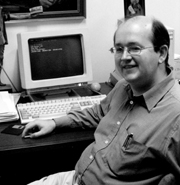
Rev. Raymond Lafontaine. The priest recently took four of his nieces
and nephews to see the popular Harry Potter movie. He subsequently wrote
a homily about how the book and the film illustrate such Christian values
of truth over falsehood, good over evil, and self-giving love over self-interest.
The essay was published January in The Catholic Register.
Photo by Bernard Glover
|
by Barbara Black
Ray Lafontaine would be making a lot more money now if he had
stayed in his first career as an actuary, but money isn’t his idea
of success.
He was looking for spiritual meaning and a way to help others, and he
has found it as a Roman Catholic priest, a part-time teacher of theology
and the newest of Concordia’s five chaplains.
“It’s our goal to respond to the explicitly religious and spiritual
concerns of the students, but these are so tied up with social and cultural
concerns that we end up dealing with much more,” he said.
A typical day might start with a meeting with his colleagues. Then he
might have a visit from a student who needed an emergency food voucher.
Every day at noon, he celebrates mass in the Loyola Chapel.
In the afternoon, he might plan a students’ retreat (time out, often
in the country, for meditation), work on his homily for the 11 a.m. Sunday
service at the chapel, see individual students for counselling or couples
for marriage preparation, and plan a liturgy (religious service). The
Loyola Chapel has a progressive approach, not only to liturgy, but to
social justice and community outreach.
In an institution as diverse as Concordia, Lafontaine is inclined to take
a broad, ecumenical approach to faith, though as a Roman Catholic, he
is mindful of his own constituency. However, he finds that the real communications
gap is not between religious denominations, but between the spiritual
seekers and the resolutely secular.
“Many young people are spiritually hungry, but they’re, well,
religiously illiterate,” Lafontaine said. About 30 years ago in Quebec,
there was a seachange in attitudes to the church, reflecting a change
that occurred, though less dramatically, throughout most of the Western
world.
At Concordia, Lafontaine meets the children of the generation that violently
rejected the church. Unlike their parents, he says, they are not antipathetic
to religion — in fact, many of them are actively curious and receptive
— but they have no knowledge of their own religious heritage, and
no vocabulary with which to talk about it.
Nevertheless, the interest is there, mainly expressed through students’
choice of electives. “There’s been an incredible expansion —
175 students signed up for the Introduction to Theology course!”
This term, Lafontaine launched a non-credit program called video divina
(a play on lectio divina, spiritual reading), which had students watch
films such as The Remains of the Day and Babette’s Feast, and discuss
them from a religious perspective.
He graduated from McGill with a BSc in mathematics in 1985. He worked
as an actuary for a year, then entered St. Paul’s Seminary in Ottawa,
where he earned his MA in Christian ethics. He was ordained a priest in
the Archdiocese of Montreal in 1991. He put in five years as a parish
priest in St. Luke’s, a bilingual parish in Dollard des Ormeaux,
an experience he thoroughly enjoyed, and then returned to academic life,
taking a licenciate and a doctorate in moral theology at the Gregorian
University in Rome.
Lafontaine is also the Canadian co-chair of the North American Congress
on Vocations to the Ordained Ministry and Consecrated Life, scheduled
to take place in Montreal in April.
While media attention on the congress naturally focuses on the precipitous
drop in available parish priests, assigning blame to the Catholic Church’s
requirement of celibacy, Lafontaine says the issue is bigger and more
complex than that. It involves selling a modest, self-effacing, often
hardscrabble “lifestyle choice” to a noisy, often self-obsessed
consumer society.
Still, it’s a challenge he doesn’t mind facing. “We need
to be able to engage with popular culture,” he said. “I see
my job as building bridges.”
|
|
|



